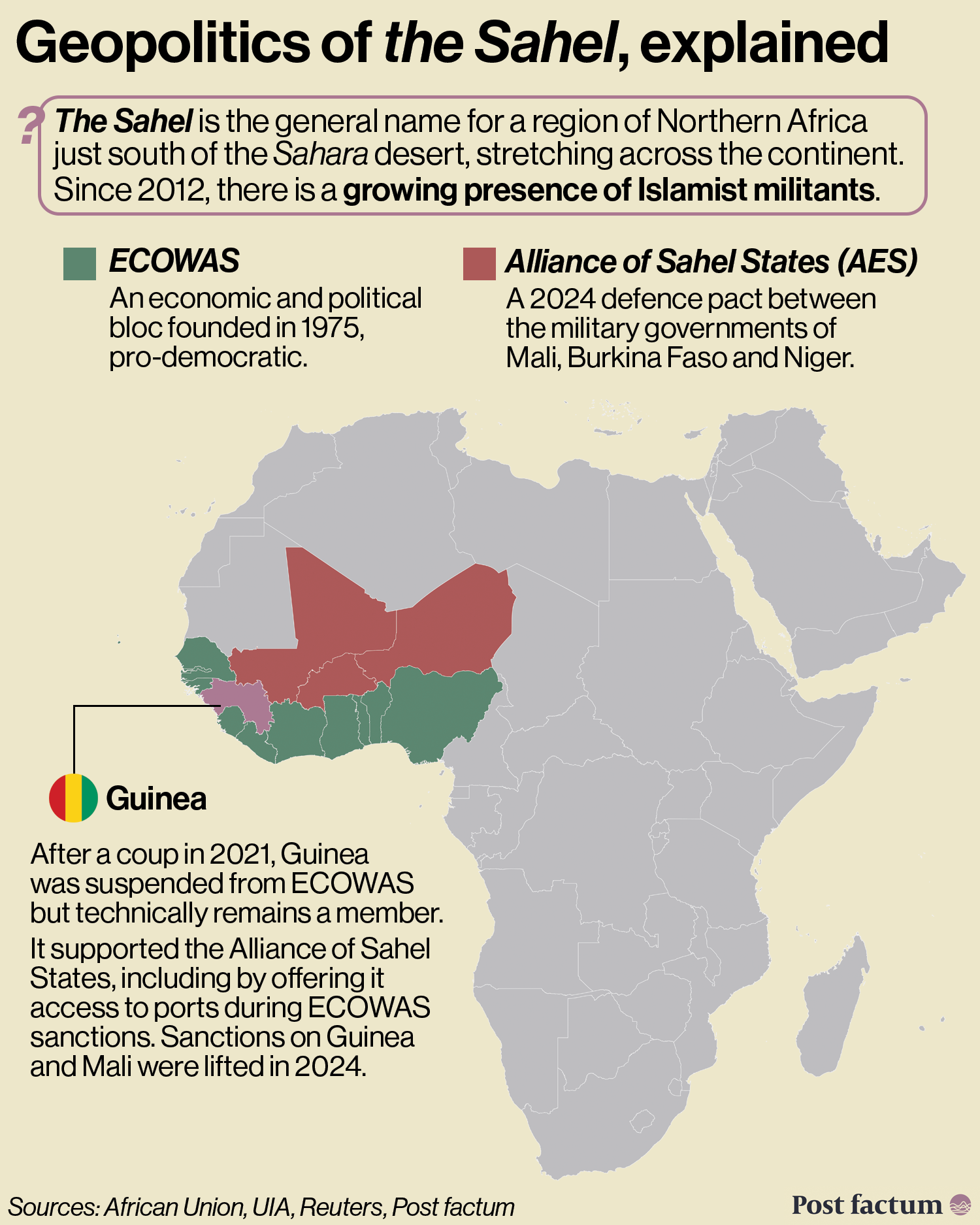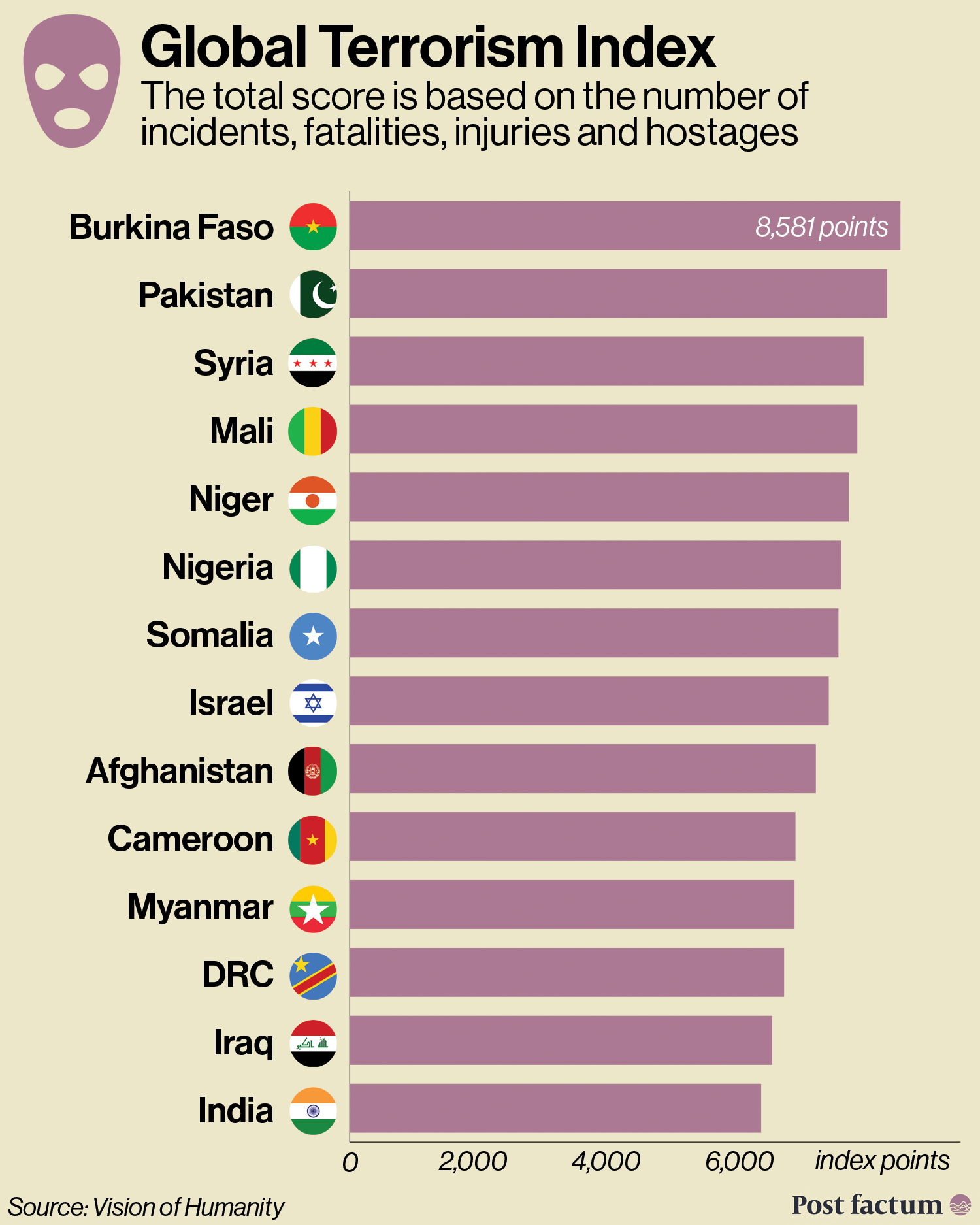Geopolitics of the Sahel
August 17, 2025
The Sahel is a region of Northern Africa that has become a source of major geopolitical tensions, especially between France and Russia.
The Sahel is suffering from years of conflict with Islamist militant groups, and ecological collapse.
Between 2020 and 2025, the region saw a series of coups (violent seizure of power, often by the military).
As a result, the following countries are now run by juntas (a ruling group of military officers): Burkina Faso, Chad, Guinea, Mali, Niger and Sudan.
Why it matters
The Sahel is a key transit route for sub-Saharan migration to Europe: without effective government control in the Sahel and Northern Africa, Europe can expect to receive a larger number of migrants every year.
The new military leaders in the Sahel have refused support from France, the former colonial ruler of many states in the region, and pushed for its military to leave.
Instead, they have increasingly relied on support from Russia, especially through its Wagner Group mercenary company, as the Sahelian states continue to fight Islamist militant groups.
For example, the army of Burkina Faso currently controls around half of the country’s territory.
Instability can spread across borders, both within the region and beyond.
Insurgencies (uprisings) and jihadi terrorism weaken both governments and social institutions, creating more conflict.
The current instability traces its roots to the 2011 war in Libya. You can read more about the conflict in our separate report.
Libya was Africa’s wealthiest country and a dictatorship.
In 2011, a civil war broke out. NATO intervened in the conflict, claiming they were protecting civilians but the mission quickly led to a regime change.
Rival militias and factions emerged, fighting for political control and the country’s oil wealth.
The anarchy in Libya spilled over into neighbouring countries in the Sahel.
Weapons that were looted from Libyan warehouses were sold across the region’s long and largely uncontrolled borders in the desert.
Many Sahelians had worked in Libya but economic crisis meant that they were no longer able to support their families back home.
The first country to be affected was Mali.
Rebels from the Tuareg ethnic group armed with Libyan weapons were fighting a separatist insurgency (an uprising for independence).
In addition, the presence of Islamist and jihadist groups became bigger, which led to Mali requesting support from its former colonial ruler, France.
In 2013 France launched Operation Serval, during which French and Malian forces managed to retake control of major cities and kill leading Islamist figures, who had introduced a strict interpretation of Islamic law in areas they controlled.
In 2014 Operation Serval was replaced with Operation Barkhane, which sought to build on the success of Serval and eliminate the Islamist threats that remained.
However, France and their regional allies failed to do so, leading to growing anti-French sentiments as well as declining support for civilian governments in the Sahel.
Military Coups
In 2020, Mali experienced a military takeover, setting off a series of coups across the region.
The new military juntas have been able to mobilise popular support by presenting themselves as protectors of the nation, defenders of sovereignty, and patriots.
The military governments in Mali, Burkina Faso and Niger in particular have also worked together to support each other.
ECOWAS is a political and economic bloc of West African states formed in 1975. Internationalist and pro-democratic.
In 2023, following the coup in Niger, ECOWAS threatened military intervention in order to restore the civilian government.
However, Mali and Burkina Faso threatened to support Niger, leading to ECOWAS backing down and imposing economic sanctions.
The three countries have joined together to form a bloc known as the Alliance of Sahel States (AES), and leaving ECOWAS.
France Out, Russia In
Despite European colonial rule ending in the 1960s, France remained the dominant external actor in the Sahel.
Cultural: French continues to either be the official language or the main language for interethnic communication for most of the countries in the region.
Economic: National reserves have been held in the French central bank.
Military: France has maintained a military presence in the region while also intervening in some conflicts.
Political: Local elites are often educated in France or backed by the French government.
The region has also been vital for France’s energy needs:
Niger is a major source for uranium, which is needed for both nuclear energy and weapons.
75% of France’s energy comes from nuclear power and Niger was its main supplier of uranium.
Since the breakdown of ties, France has had to find new sources, such as in Central Asia.
French intervention in Mali in the early 2010s received significant public support, but it has fallen since then across the region as the failure to combat Islamists became clear.
The new military juntas have capitalised on these anti-French attitudes.
One of the first moves these juntas have carried out is calling for the departure of French troops and the cancellation of existing partnerships.
Even civilian governments, such as those of Senegal and Ivory Coast, have now called for French troops to leave their countries.
While Russia has become more isolated in Europe, it has become a bigger player in Africa.
It still benefits from positive attitudes on the continent because of the Soviet Union’s support for anti-colonial movements.
The Russian government promoted these themes, accusing Western governments of neocolonialism in Africa and elsewhere.
Russia has sponsored a complex information campaign on the continent, from targeted online content to establishing a journalism school in Mali.
Russia’s recent involvement in the Sahel began indirectly through the state-backed mercenary organisation known as the Wagner Group.
The Wagner Group grew out of the conflict in Ukraine but later saw success in Syria and the Central African Republic.
The Wagner Group being a private organisation allowed Russia to initially deny involvement, while local governments usually paid the mercenaries for their services.
In 2021, Mali invited the Wagner Group to replace the French and assist in fighting Islamist rebels.
However, in 2023 Wagner Group’s leader Yevgeny Prigozhin attempted to start a rebellion in Russia.
The rebellion failed, and Russia took over the direct control over the Wagner Group. It has been largely replaced by the Ministry of Defence-controlled Africa Corps.
Russia has been providing the Sahelian governments with an alternative to the French presence, as well as military equipment, training, and political support.
The Islamist Surge
As a result of the collapse of the Libyan state, the circulation of weapons, and growing disorder in the region, jihadi groups grew in size and strength.
Jihad – a struggle or fight against the enemies of Islam.
Some of these groups are affiliated with international terrorist organisations, like al-Qaeda and the Islamic State.
In practice, these groups tend to be local in origin but want to use the reputation of their more famous counterparts.
New groups are formed as local leaders fight among themselves.
The growth in Islamic extremist violence is part of a broader trend across the African continent, including Nigeria, Somalia and Mozambique.
By 2021, at least 7 groups were operating in 6 countries.
These groups managed to find recruits as a result of the region’s high levels of poverty, unemployment, poor governance, and ethnic conflict.
Jihadi groups exploit the absence of a government, such as by resolving disputes, providing necessities and offering protection.
Counter-insurgency efforts by local governments are often ineffective and alienate local populations, increasing support for militant groups.
Jihadi groups have also relied on criminal activities to fund their existence and fighting, including by extorting, kidnapping and terrorising locals.
In 2024 Burkina Faso, Mali, and Niger ranked among the top 5 of the Global Terrorism Index.
Climate change is worsening the situation in the Sahel.
The region is one of the world’s most vulnerable areas to global warming.
The Sahel is expected to see temperature rises at 1.5 times above the global average despite producing less than 1% of global emissions.
With one of the world’s poorest populations, the Sahel is not strongly positioned to fight against or even adapt to climate change.
Water shortages, for example, are expected to continue to worsen while desertification continues to intensify.
The majority of the population (which is also growing) relies on agriculture, fishing, or livestock farming. These are all at risk due to climate change.
The main ecological threats facing the population include:
Lower agricultural productivity
Continued soil erosion
Crop losses from droughts and flooding
Reduced biodiversity
While the people of the Sahel are the ones experiencing instability, the effects are global.
Migration, conflict and climate change as well as the ability to meet these challenges during an era of multipolarity and great power competition will define much of the 21st century.
Author Naman Habton, PhD
Editor Anton Kutuzov
More below:
Further reading and sources
Violent extremism in the Sahel (CFR: Global Conflict Tracker)
Military coups, jihadism and insecurity in the Central Sahel (OECD)
”Russia Is Riding an Anti-Colonial Wave Across Africa” (RAND)
Mapping the contours of the jihadi presence in the Sahel (King’s College)
The Sahel and the Challenges of Climate Change (Alliance Sahel)
Join the discussion:



